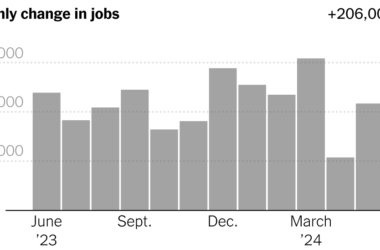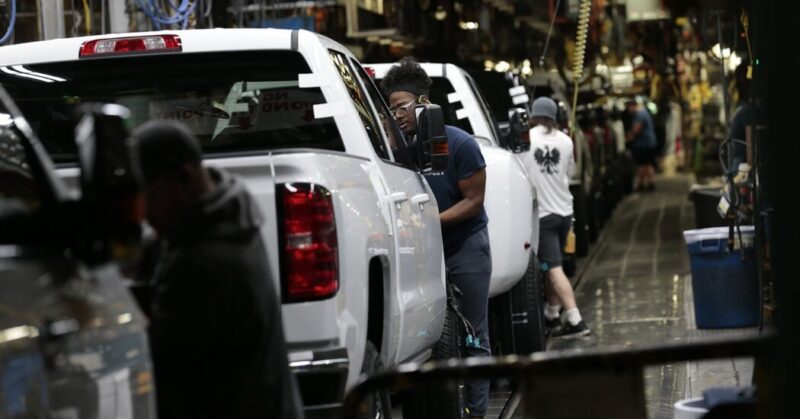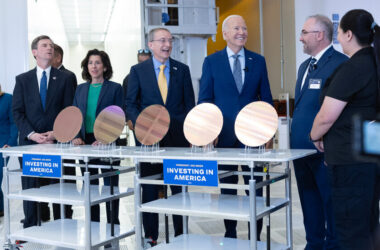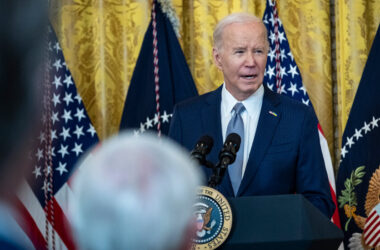A vote on a tentative contract agreement between General Motors and United Automobile Workers union, offering record wage increases, has faced strong opposition from veteran workers.
Voting at most union locals has been completed, and the final result, likely to be decided by a narrow margin, is due as early as Thursday evening. Majority of workers at several large plants in Michigan, Indiana, and Tennessee have rejected the contract, while union members at a large sport utility plant in Arlington, Texas, approved it.
G.M., Ford Motor, and Stellantis reached similar contracts with the union after U.A.W. members went on strike at select plants and warehouses. Workers went on strike at the first three plants on Sept. 15 and remained on strike for over 40 days. This was the first time the union had struck all three automakers simultaneously, though it did not shut down all of the companies’ factories.
The agreement seems likely to be ratified at Ford and Stellantis, the maker of Chrysler, Jeep, and Ram vehicles, by comfortable margins, according to running tallies published online by the U.A.W.
At G.M., many veteran workers have opposed the contract due to their desire for the company to contribute more money to retirement plans and the cost of health care for retirees.
David Green, director of the U.A.W. Region 2B, which includes Ohio, Indiana, and a small part of Michigan, mentioned, “I’ve heard from some traditional workers who said there wasn’t enough in there for them,” He voted for the contract.
David Miller, a 20-year G.M. veteran who works at a big truck assembly plant in Flint, Mich., said the absence of retiree health benefits was the reason he had voted no. “I’m not voting yes on any contract that doesn’t have that in it because I don’t need the health care when I’m 25 — I’m 65,” he said. “I’m at the mercy of Medicare.”
General Motors declined to comment on the contract vote.
The tentative contract raises the top wage by 25 percent, from $32 to more than $40 over four and a half years. The increase is more than the combined wage increases the union has won over the past 22 years, according to U.A.W. officials.
Newer hires, who are lower on the pay scale, will see larger increases that take them to the new top wage. And workers who were recently hired will see their hourly pay double.
The agreement also provides for cost-of-living adjustments that will nudge wages higher if inflation persists, enhanced company contributions to pensions and retirement plans, more paid time off, and the ability to strike if any plant is closed during the contract’s term.
To be ratified, the agreement must secure a simple majority. More than 46,000 U.A.W. workers are employed at G.M., although not all of them are likely to turn in ballots. More than 14,000 company employees participated in the targeted strikes.
As of Wednesday afternoon, an online vote tally that the union maintains showed that just over 54 percent of the votes were in favor of the contract, but that tally did not include numbers from some big plants.
If the tentative agreement is voted down, it will represent a big setback for the U.A.W. president, Shawn Fain, who was elected this year and promised to take a more aggressive approach in the contract talks in hopes of winning significant pay increases and reversing some of the concessions the union accepted in past contracts.
He appeared to deliver that in what was widely regarded as a record deal. President Biden, who joined striking workers on the picket line in September at a G.M. site in Belleville, Mich., hailed Mr. Fain’s efforts. The president joined Mr. Fain last week at a plant in Belvidere, Ill., that Stellantis agreed to keep open after halting production this year.
“I don’t think it diminishes Shawn Fain’s luster that much because of a close ratification vote,” said Arthur Wheaton, director of labor studies at Cornell University School of Industrial and Labor Relations. “It just means expectations were high, and had he not delivered as much as he did, it wouldn’t have passed.”
After the contracts with the three Detroit automakers are ratified, Mr. Fain hopes to try to organize workers at nonunion plants in the South owned by Toyota, Honda, and other foreign automakers, and the nonunion plants that Tesla operates in California and Texas.
Since the terms of the U.A.W. agreements were announced, some of those companies have increased wages of factory workers. Toyota has told workers that it will raise hourly rates by 9 percent in January. Honda and Hyundai will lift wages 11 percent and 14 percent next year. Hyundai plans to increase wages 25 percent by 2028.
“Everybody at those companies should say, ‘Thank you, U.A.W.,’” Mr. Wheaton said. “Those increases wouldn’t have happened without the new U.A.W. contract.”
Sophia Lada contributed reporting.








